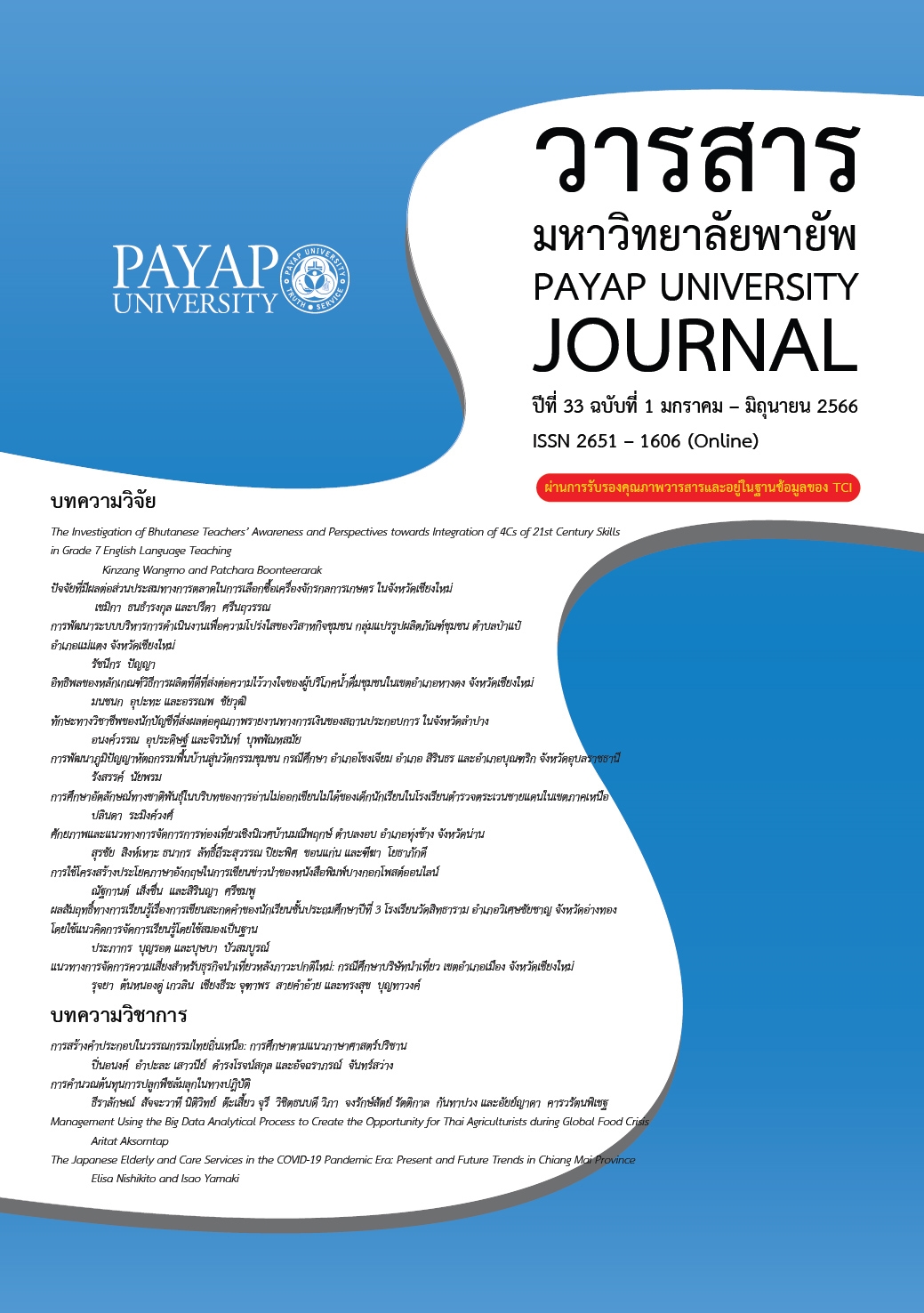การศึกษาการตระหนักรู้และการรับรู้ต่อการบูรณาการทักษะโฟร์ซีของทักษะในศตวรรษที่ 21 กับการเรียนการสอนภาษาอังกฤษในระดับชั้นมัธยมศึกษาปีที่ 1 ของครูผู้สอนชาวภูฏาน
Main Article Content
บทคัดย่อ
การศึกษาการบูรณาการทักษะโฟร์ซีซึ่งประกอบไปด้วยทักษะการคิดวิเคราะห์และการแก้ไขปัญหา ทักษะการคิดเชิงสร้างสรรค์และนวัตกรรม ทักษะการสื่อสาร และทักษะการทำงานเป็นทีม กับการเรียนการสอนภาษาอังกฤษอย่างแพร่หลาย เนื่องด้วยทักษะโฟร์ซีได้รับการยอมรับว่าเป็นทักษะ ที่มีความจำเป็นต่อการเรียนรู้ในศตวรรษที่ 21 อย่างไรก็ตาม การศึกษาในหัวข้อการบูรณาการทักษะ โฟร์ซีในการเรียนการสอนในประเทศภูฏาน ยังมีข้อจำกัดทั้งด้านจำนวนงานวิจัยและหัวข้อที่ได้รับการศึกษา ดังนั้น งานวิจัยนี้จึงมีจุดมุ่งหมายเพื่อที่จะศึกษาการตระหนักรู้และการรับรู้ต่อการบูรณาการทักษะโฟร์ซีกับการเรียนการสอนภาษาอังกฤษในภูฏาน ประชากรที่ศึกษาประกอบด้วย ครูผู้สอนภาษาอังกฤษในชั้นมัธยมศึกษาปีที่ 1 ในอำเภอมอนการ์ ประเทศภูฏาน จำนวน 16 คน เครื่องมือที่ใช้ ในการวิจัยประกอบด้วยแบบสอบถามและแบบสัมภาษณ์แบบกึ่งโครงสร้าง ครูผู้สอนทั้ง 16 คนได้ตอบแบบสอบถาม และมี 6 คนเข้าร่วมรับการสัมภาษณ์ ผลวิจัยพบว่า ครูชาวภูฏานมีระดับการตระหนักรู้เกี่ยวกับทักษะ 4Cs ในระดับที่สูง (μ = 4.32) และผลวิจัยพบว่า ครูผู้สอนมีการบูรณาการทักษะโฟร์ซีกับการเรียนการสอนภาษาอังกฤษผ่านการเรียนการสอนแบบมีปฏิสัมพันธ์ เช่น การโต้วาที และการแสดงบทบาทสมมุติ
Article Details
เอกสารอ้างอิง
Anderson, L. W. & Krathwohl, D. R (2001). A taxonomy for learning, and assessing: A revision of Bloom’s Taxonomy of educational objectives. Longman.
Bedir, H. (2019). Pre-service ELT teachers’ beliefs and perceptions on 21st century learning and innovation skills (4Cs). Journal of Language and Linguistic Studies, 15(1), 231-246.
Bhutan Council for School Examination and Assessment (BCSEA). (2019). Education in Bhutan. Findings from Bhutan’s experience in PISA for Development. National Project Centre.
Chiruguru, S. B. (2020). The essential skills of 21st century classroom (4Cs). DOI:10.13140/RG.2.2.36190.59201
Chophel, Y., & Norbu, L. (2021). Effect of Kagan cooperative learning structures on learning achievement: An experimental study. International Journal of Multidisciplinary Research and Explorer (IJMRE), 1(9), 124-132
Erdogan, V. (2019). Integrating 4C skills of 21st century into 4 language skills in EFL classes. International Journal of Education and Research, 7(11), 113-124.
Foster-Fishman, P. G., Berkowitz, S. L., Lounsbury, D. W., Jacobson, S., & Allen, N. A. (2001). Building collaborative capacity in community coalitions: A review and integrative framework. American journal of community psychology, 29(2), 241-261.
Gafoor, K. A. (2012, November). Considerations in the measurement of awareness [Paper presentation]. National Level Seminar On Emerging Trends in Education, Kerala, India. https://eric.ed.gov/?id=ED545374
Greenstein, L. (2012). Assessing 21st century skills: A guide to evaluating mastery and authentic learning. Corwin Press.
Halvorsen, A. (2018). 21st century skills and the “4Cs” in the English language classroom. American English Institute, 0-4. https://scholarsbank.uoregon.edu/xmlui/bitstream/handle/1794/23598/halvorsen_21_century_skills.pdf?sequence=1&isAllowed=y
Chigangacha, P. S., & Haupt, T. C. (2022). Client roles in influencing project delivery outcomes. In T. C. Haupt., M. Akinlolu., F. Simpeh., C. Amoah., & Z. Armoed (Eds.). Construction in 5D: Deconstruction, Digitalization, Disruption, Disaster, Development: Proceedings of the 15th Built Environment Conference (pp. 217-230). Springer. https://doi.org/10.1007/978-3-030-97748-1_18
Huber, R. B., & Snider, A. (2006). Influencing through argument. IDEA.
Jacobson-Lundeberg, V. (2016). Pedagogical implementation of 21st century skills. Educational Leadership and Administration: Teaching and Program Development, 27, 82-100.
Kivunja, C. (2014). Innovative pedagogies in higher education to become effective teachers of 21st century skills: Unpacking the learning and innovations skills domain of the new learning paradigm. International Journal of Higher Education, 3(4), 37-48.
Li, L. (2016). Integrating thinking skills in foreign language learning: What can we learn from teachers’ perspectives? Thinking Skills and Creativity, 22, 273-288.
Nima, L., & Chalermnirundorn, N. (2018). Tenses with ESL writing tenses: A case study of Bhutanese secondary students. [Master’s Thesis, Rangsit University]
Noonan, S. (2013). How real teachers learn to engage all learners. Latham, MD: Rowman & Littlefield Education.
Ojo, G. (2019). Acquiring the 4cs (Communication, Collaboration, Critical Thinking and Creativity) through integrating the four language skills in secondary ELS classrooms in Nigeria. LWATI: A Journal of Contemporary Research, 16(1), 42-54.
Orak, S. D. (2019). Teachers’ awareness and actual practices of 21st century learning and innovation skills [Master’s thesis, ÇAĞ University]. ERIC.ed.gov.
Pardede, P. (2020). Integrating the 4Cs into EFL integrated skills learning. Journal of English Teaching, 6(1), 71-85. https://doi.org/10.33541/jet.v6i1.190
Phuntsho, U., & Wangdi, D. (2019). The effect of using six thinking hats strategy on the development of writing skills and creativity of seventh grade EFL students. I-manager’s Journal on English Language Teaching, 10(2), 27-35
Sternberg, R. J., & Lubart, T. I. (1999). The concept of creativity: Prospects and paradigms. In R. J. Sternberg (Eds.), Handbook of creativity (pp. 3-15). Cambridge University Press.
Tran, V. T. H. (2021). EFL teachers' perceptions of the significance of “Four Cs” and their suggestions to enhance “Four Cs” for high school EFL students in Vietnam. International Journal of Science and Management Studies (IJSMS), 4(5), 134-162. DOI: 10.51386/25815946/ijsms-v4i5p112
Trilling, B., & Fadel, C. (2009). 21st Century Skills: Learning for Life in Our Times. Jossey-Bass.
Urdan, T. C. (2001). Statistics in plain English. Lawrence Erlbaum Associates. Publishers.
Warschauer, M. (2007). Technology and writing. International handbook of English language teaching, 907-917.
World Bank. (2009). Findings from the Bhutan learning quality survey (Report no. 21). Author. https://openknowledge.worldbank.org/handle/10986/17940?locale-attribute=en
Yangdon, K. (2019). Identifying critical thinking skills of 2nd year. Bachelor of Language and Literature students at Taktse, Trongsa. Bhutan Journal of Research & Development, 8(2), 55-70.


